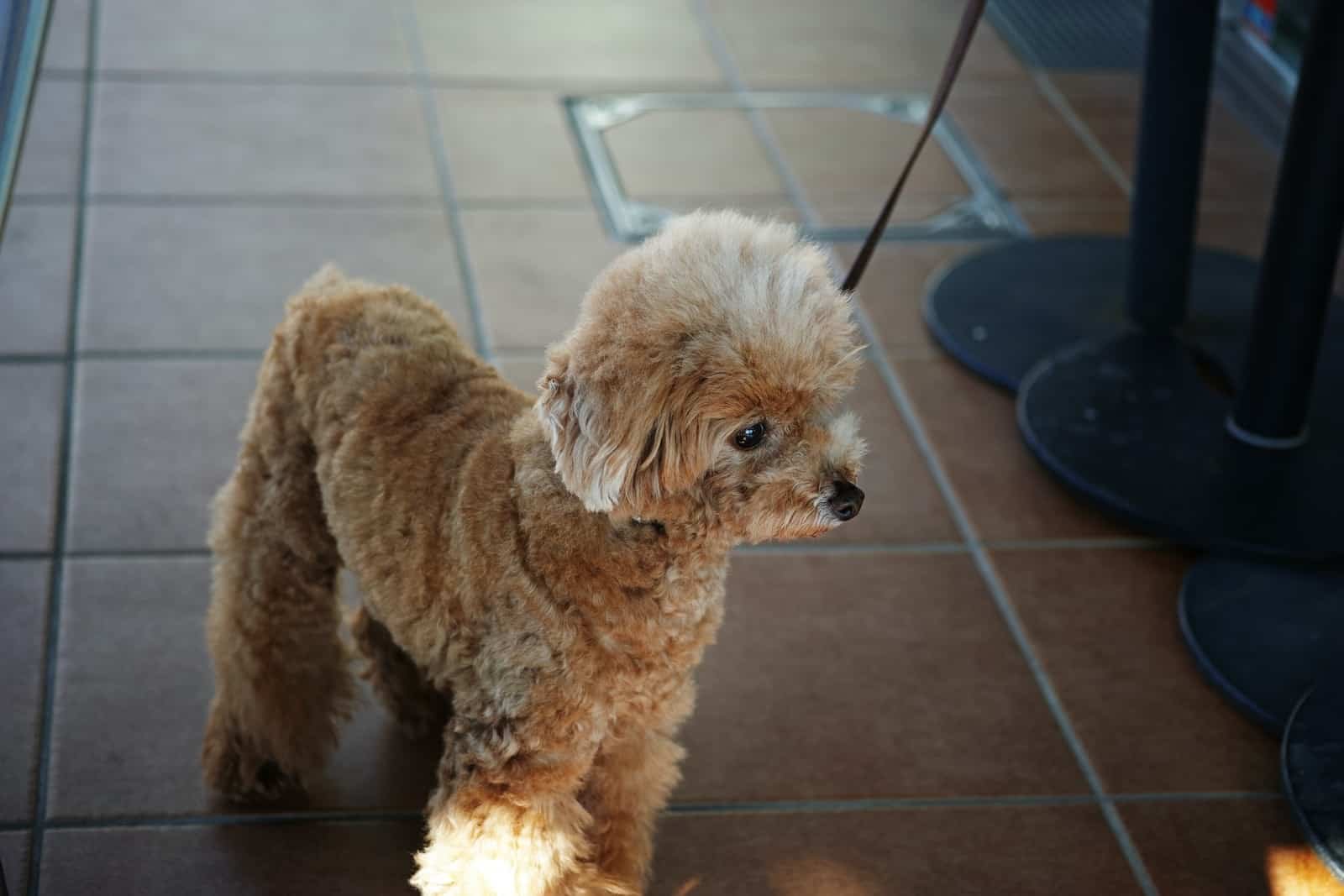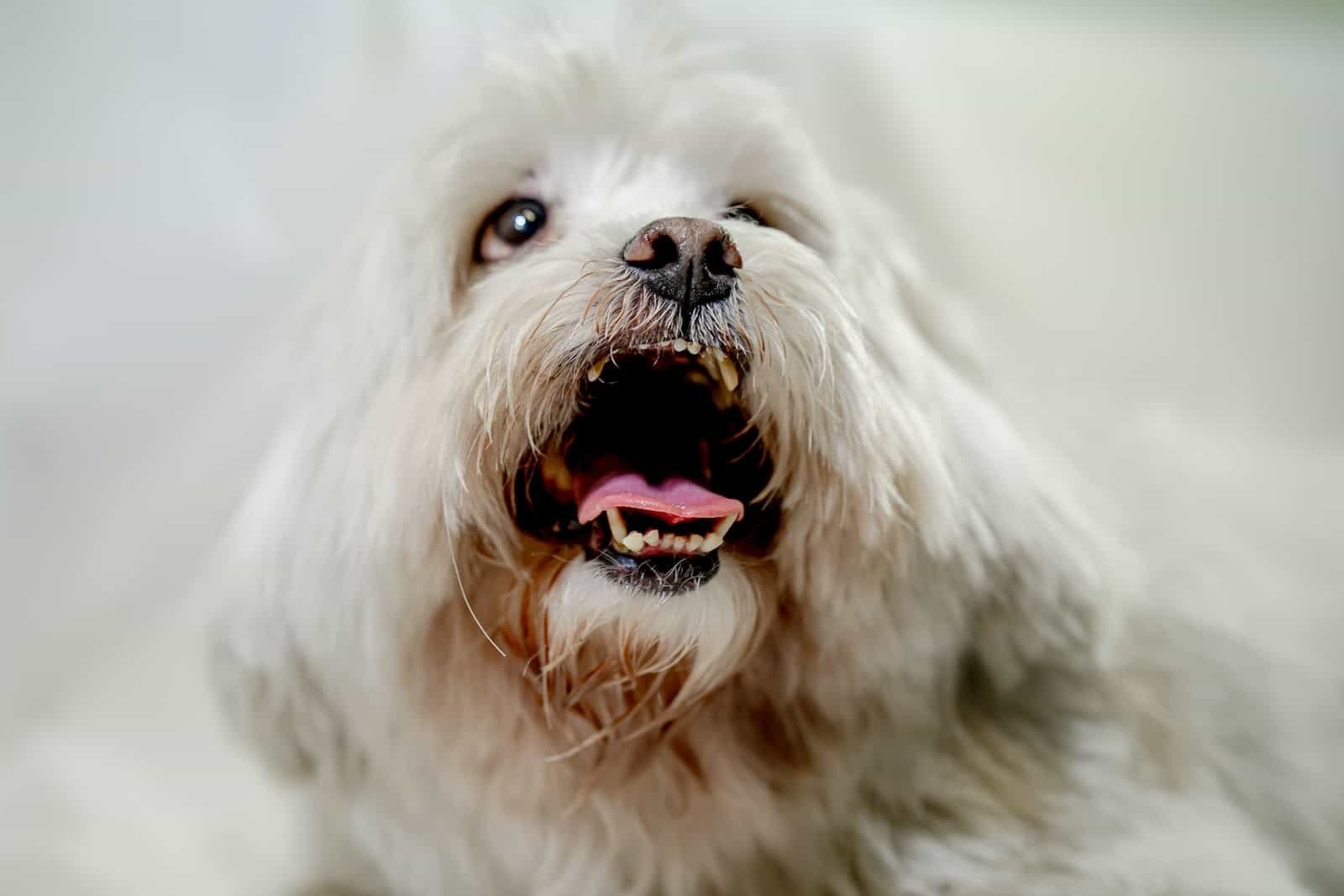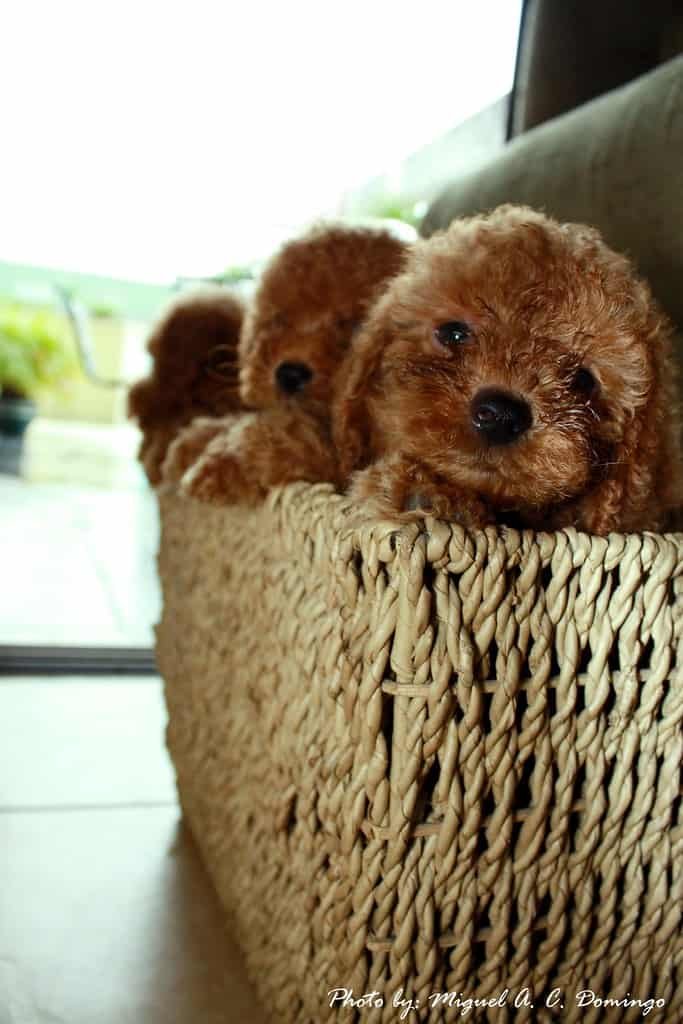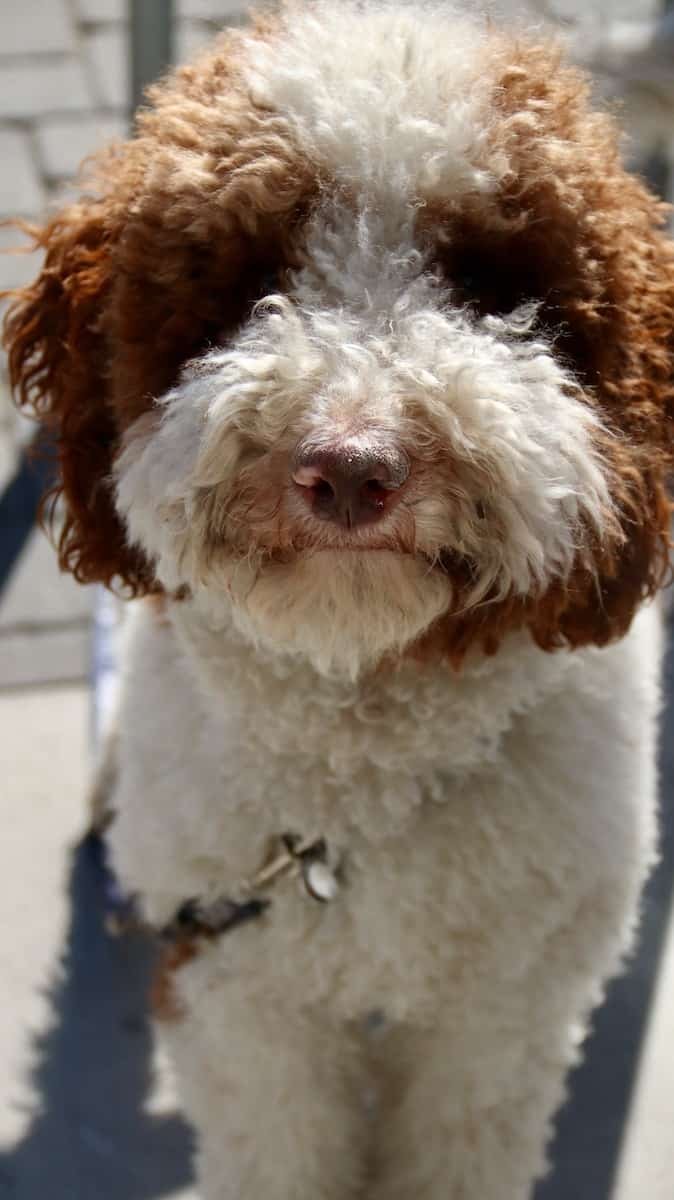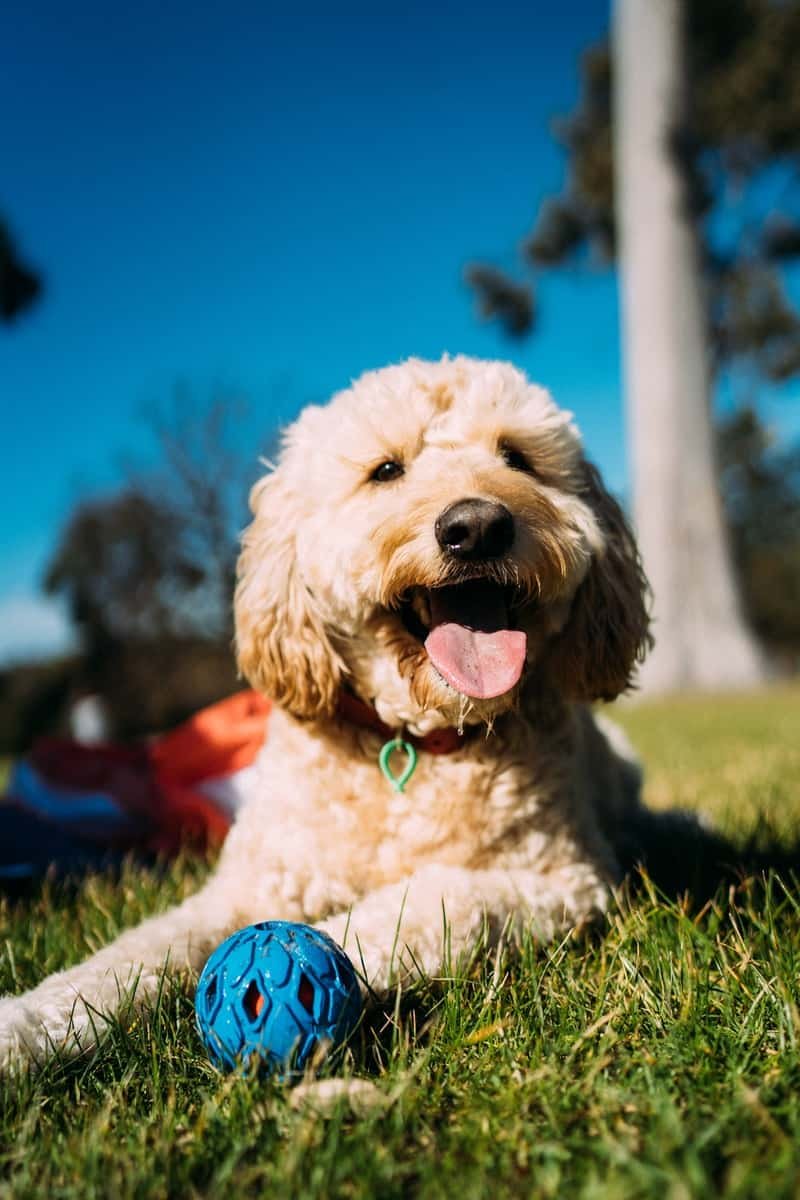
When you see photos of the Mini Goldendoodle, your heart will surely jump! It’s such an adorable breed that everyone will love, from the shaggy and curly coat down to the active and loving attitude.
But before owning a Mini Goldendoodle, it’s essential you know what to expect. This article talks about what to know about the Miniature Goldendoodle, so read on!
What is the Miniature Goldendoodle?
The Mini Goldendoodle, which we also call a Mini Groodle, is a kind of Doodle and cousin of the extremely popular Goldendoodle.
Mini Goldendoodles cross between the Golden Retriever and Miniature Poodles, hence a small offspring.
While there isn’t a detailed history about the Mini Goldendoodle, the parent breeds have a vast one!
Miniature Poodles are a smaller version of the Standard Poodle, measuring about 11-15 inches tall and weighing 15-17 pounds.
These Poodles came after the Standard Poodle. Instead of working as water retrievers like the bigger Poodle, Miniature Poodles worked as truffle sniffers because of their smaller size, preventing the truffles’ damage.
As for the Golden Retriever, it’s a classic family dog. People initially bred the Golden Retriever to work as water retrievers like Standard Poodles.
That’s what both Poodles and Golden Retrievers have in common – They are incredibly active with high intelligence and activity levels!
As you search for Mini Goldendoodle dogs, you probably come across terms like “first generation,” “F1,” or “F1b.”
- The F1 Mini Goldendoodle, also known as first-generation, refers to purebred Golden Retrievers crossed with purebred Miniature Poodles. That means your dog is 50% Miniature Poodle and 50% Golden Retriever, having purebred parent breeds.
- F1b Mini Goldendoodles refer to Mini Goldendoodles crossed with a Miniature Poodle. These Mini Goldendoodles are 75% Miniature Poodle, so they are less likely to shed, suitable for allergies.
- F2 Mini Goldendoodles refer to a cross between two Mini Goldendoodles.
- F2b Mini Goldendoodles refer to a cross between an F1 and F1b Mini Goldendoodle.
Miniature Goldendoodle Appearance
Since Mini Goldendoodles are one of the Poodle mixed breeds, their appearance varies. Puppies born from the same litter might even have different appearances!
Their size and weight vary greatly, with Mini Goldendoodles measuring about 13-20 inches tall and weighing 15-35 pounds.
The mixed breed’s fur would have some shades of brown or red, ranging from a light cream color to rich auburn red. You might find small white markings on the chest.
The fur can either be curly or wavy, with floppy ears. It all depends on what genes your Mini Goldendoodle inherits from its parent breeds.
Miniature Goldendoodle Temperament
One thing’s for sure – Mini Goldendoodles get their parents’ social and outgoing attitudes. These are not dogs for introverts!
When you go for a walk with a Mini Goldendoodle, he will try to meet and greet everyone he sees.
That’s why you won’t have to worry about any aggression towards new people and animals. As long as your Mini Goldendoodle socialized early on, he won’t bite or act hostile unless the said person or animal is suspicious.
Furthermore, just like their parents, Mini Goldendoodles are highly energetic and active dogs. These dogs are also brilliant, requiring physical and mental exercise every day. If you don’t give your Mini Groodle enough exercise, it feels boredom and frustration, resorting to destructing furniture and whatever’s around. So, if you are out of the house, leave toys that help improve your dog’s mental stimulation.
Because of the Mini Goldendoodle’s high energy levels, they are pretty nervy with short attention spans. These dogs require consistent training with positive reinforcement. Mini Goldendoodles may not be the best additions to families if you’re not up for this.
Do They Bark?
Mini Goldendoodles can be loud dogs, barking when happy, excited, bored, suspicious, or just about most of the time.
That said, you can train your Mini Groodle to bark less, but it’s impossible to eradicate all of the barkings. So, if you don’t like the barking or have neighbors nearby that feel the same, then the Mini Goldendoodle may not be the choice for families.
Do They Love Cuddling?
Heck yes, Mini Goldendoodles love cuddling! No matter how big they get, Mini Goldendoodles will snuggle up with you every chance they get. Furthermore, this dog loves pets, brushing, and more cuddles.
These dogs most especially love being around children, thriving with big families. It’s why Mini Goldendoodles can become therapy dogs since they aren’t only intelligent and affectionate.
The Mini Groodle is very loyal and people-oriented, wanting to be with you all the time. While that’s such an endearing trait, it can become an issue. Your Mini Groodle can become too attached to you or other human owners at home, suffering from separation anxiety when left alone.
Separation anxiety can lead to unwanted behavioral issues, like howling, barking, chewing, and the like. Because of that, you have to socialize your Mini Groodle well and provide a lot of mental stimulation when he’s on his own.
Are Mini Goldendoodles Good Dogs?
Mini Goldendoodles are devoted companions when you meet their care needs. When you give your dogs time to train and exercise them and give them lots of good food and love, then you’ll have loyal and wonderful companion animals who will stay by your side for life.
You have the best family pet with high intelligence, social skills, and outgoing nature.
If you can’t meet your dog’s needs, he can develop behavioral issues, such as barking incessantly, acting destructively, or showing reactive behaviors. Furthermore, unsocialized dogs can act boisterous around other animals, even beginning escalations that lead to fights!
Overall, you get a pet that’s eager to please with a low prey drive so that it will love its human owners and other pets, such as dogs and cats.
Not only do Mini Goldendoodles do well as family dogs, but they also thrive as therapy and service dogs with their loyalty and protectiveness. Their high intelligence levels also make them easier to train to work as service dogs.
Miniature Goldendoodle Health Issues
The Mini Groodle is associated with various medical issues and health concerns. The Mini Goldendoodle lifespan is about 12-16 years since the miniature breed lives longer than the larger Standard Poodle.
These dogs have genetic disorders from their parents, so you need to watch out for the following health conditions:
- Progressive retinal atrophy: An inherited disease involving the retina’s bilateral degeneration, resulting in blindness.
- Von Willebrand’s disease: An inherited blood-clotting disorder that causes your Mini Groodle to have inadequate plasma protein, encouraging blood clotting. Dogs who have this disease would experience a lot of bleeding, even in minor skin wounds.
- Bloat (Gastric Dilatation Volvulus): This happens when a Mini Groodle’s stomach fills with food, fluid, or gas then expands, putting pressure on the surrounding organs.
- Patellar luxation: Dislocated knee injury common in smaller breeds, like the Miniature and Toy hybrid breed.
- Hypothyroidism: A disease that leads to inadequate hormone production in the thyroid gland.
- Hip dysplasia and elbow dysplasia: A joint disorder that causes deformities in the hip or elbow.
- Ear infections: Common in the Mini Groodle because of their floppy ears and hair all around the area.
- Allergies: It can come from any triggers around the house or skin allergies from poor grooming practices.
While the Mini Groodle is one of the healthy breeds, one can’t ignore the potential health issues. That’s why you need to make sure you take your pet to the vet regularly to prevent and treat health conditions. Furthermore, ensure that your dog’s vaccination records are up-to-date, and you can consider giving your dog genetic tests and health clearances to know what your dog is up against in the future.
Miniature Goldendoodle Maintenance Grooming
Like the parent breeds, you need to stay on top of your Mini Goldendoodle’s adequate grooming requirements. While Mini Groodles don’t shed as much as other double-coated dogs, the curly coat easily mats without proper maintenance.
Fortunately, they don’t require daily brushing compared to other Poodle mixed breeds. However, it would be best if you still brush your dog’s curly coat every other day or at least twice a week.
It would help if you also clipped their coat every few months, depending on how fast their hair grows. We recommend taking them to professional grooming services to get a specific haircut and complete bath.
Speaking of baths, we recommend bathing your Mini Goldendoodle every 4-6 weeks or when he gets muddy or dirty. While you can have professional grooming services bathe your dog, you can do it at home with the appropriate dog shampoo and conditioner.
Here are other maintenance grooming requirements:
- Brush your Mini Groodle’s teeth every other day to prevent dental issues.
- Clip your dog’s nails once a week to prevent pain and discomfort as he walks on hard surfaces. It also prevents injuries if your dog accidentally scratches someone.
- Check your Mini Groodle’s eyes and ears for any dirt once a week. Clean it from any dirt and grime to prevent infections and tear stains.
Do Mini Goldendoodles Shed?
Breeders cross other dog breeds with purebred Poodles to achieve the latter’s non-shedding qualities and other desirable personality traits. While it’s likely for your Mini Goldendoodle not to shed as much, there are no guarantees.
If you or someone in the household is allergic to dogs, spend some time with your chosen Mini Goldendoodle before getting it. Allergic reactions would vary from person to person, so there aren’t ways to predict precisely how a Mini Goldendoodle’s coat will affect someone.
That said, they still shed far less than other dogs, so at least you experience less hair around the house! But even then, Mini Goldendoodles require a lot of grooming.
Do Mini Goldendoodles Smell?
Fortunately, Mini Goldendoodles don’t have that distinct doggy odor. These dogs are almost scent-free and won’t offend any sensitive noses.
However, Mini Goldendoodles are at risk of smelling if you don’t groom them properly. If you don’t brush and bathe your dog regularly, then the old skin cells and dirt particles can get caught to the coat, starting to stink. It happens to every dog breed!
Also, watch out for some smell if your dog gets wet, such as walking during rainy days or after it swims. As long as you dry your dog well and brush it properly, then you’ll both be good to go!
Miniature Goldendoodle Exercise and Training Requirements
The Mini Groodle has a moderate energy level that requires 20-30 minutes of daily exercise. Mini Groodles adapt to hot and cold climates quickly with their curly coat, suitable for most weather conditions.
While the Mini Groodle is excitable, it can match your energy level. We recommend walks, swimming, hiking, playing fetch, and other physical activities and mental stimulation games to work their minds and bodies.
As mentioned, Mini Groodles are always eager to please, so they are also just as easy to train as Poodles. That way, you won’t need to take too much time doing training repetitions.
Start with housetraining and crate training first, to follow with obedience training. Once your dog masters the basic commands, you can move towards more complex tricks and commands. You and your Mini Groodle will also love agility training since they have the retriever skill in their bloodlines!
Miniature Goldendoodle Food and Drinks
The Mini Groodle must have a healthy diet with dog food specified for smaller breeds.
Dog food should also be rich in real meat protein, carbs, fatty acids, minerals, vitamins, and adequate amounts of water.
Do not opt for any dog food with additives, corn, soy, wheat, fillers, or animal byproducts.
If you still don’t know what kind of dog food to use, then ask your veterinarian for what foods are suitable for your dog based on its gender, age, and any conditions he has. The vet will also recommend how much food your dog needs.
Besides that, ensure that your dog always has a bowl of clean drinking water to keep him hydrated.
How to Get a Miniature Goldendoodle
If you believe that the Mini Groodle is your next beloved pet, then you can purchase one from a breeder. However, a breeder can be pretty expensive, costing between $1,500 to $3,500, depending on the quality of the parent dogs and breeder.
Make sure you purchase from a reputable breeder to prevent health issues associated with the crossbreed. A reliable breeder would offer the following:
- Genetic testing to check for any inherited diseases
- Uninflated and reasonable prices
- Proper socialization for the litter of puppies
- Veterinary records with updated deworming. and vaccinations
- 2-year health guarantee
A breeder should answer your queries and communicate well, showing you the breeding environment to know that the dogs live in proper conditions.
Please do not get your puppies from puppy mills or unreputable breeders who raise their dogs and puppies in inhumane conditions.
Alternatively, you can adopt a Mini Groodle from rescue organizations and animal shelters. However, note that you may not find a Mini Groodle puppy or know its exact history and medical records, but you get a chance to save a dog and give it an excellent quality of life. Furthermore, adoption is cheaper than purchasing a Mini Groodle from a breeder, only having an adoption fee and interview process to go through.



